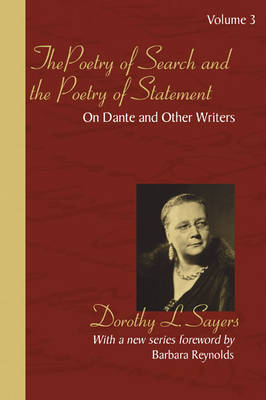
- Retrait gratuit dans votre magasin Club
- 7.000.000 titres dans notre catalogue
- Payer en toute sécurité
- Toujours un magasin près de chez vous
- Retrait gratuit dans votre magasin Club
- 7.000.0000 titres dans notre catalogue
- Payer en toute sécurité
- Toujours un magasin près de chez vous
The Poetry of Search and the Poetry of Statement
Dorothy L Sayers, Barbara Reynolds
Livre broché | Anglais
47,45 €
+ 94 points
Description
Introducing the Dante Papers Trilogy: Introductory Papers on Dante Further Papers on Dante The Poetry of Search and the Poetry of Statement The Poetry of Search, with which the book opens, puts forward the suggestion that controversy about what kind of thing poetry ought to be has tended to overlook the fact that there are two kinds of poetry, corresponding roughly to the categories of Romantic and Classical but which she prefers to describe as the Poetry of Search and the Poetry of Statement. The poet of search writes to find out what he feels--Keats is an example--and the poet of statement writes to tell what he knows--and here Dante is the master. Dante the Maker, which follows, discusses two examples of this method as poet of statement: First, how the whole of the Paradiso is built like a bridge between the first and the last terrains, and how roads from all the other parts of the poem run together to one point from which to pass over that bridge; secondly, how from a single unadorned statement in the seventh canto the reader who shares Dante's background may construct a whole labyrinth of associated imagery, turning and returning perpetually upon the central affirmation of fact in which a whole complex of meanings lies implicit. These three volumes by Dorothy L. Sayers have been unavailable for far too long. Wipf & Stock Publishers has done both Sayers and Dante studies a true service by bringing these lively, perceptive, and important works back into print. Not only do these collected essays offer engaging insights into the poetry of Dante (as well as other poets), but they also shed significant light on Sayers' own mature understanding of the Christian faith. Marjorie Lamp Mead Associate Director The Marion E. Wade Center Wheaton College It is now half a century since Dorothy L. Sayers died suddenly, her translation of Dante unfinished and her mind still active. The vigor of these papers on Dante is unequalled and together with her translation of the Commedia made possible a relationship between Dante and the modern reader which was new at the time and is still vividly alive. Barbara Reynolds, author of The Passionate Intellect Dorothy L. Sayers (1893-1957), born and educated in Oxford, was an accomplished novelist, poet, scholar, and Christian apologist. Along with her translations of Dante, her numerous writings include detective stories, radio plays, and studies of the Middle Ages and Renaissance.
Spécifications
Parties prenantes
- Auteur(s) :
- Editeur:
Contenu
- Nombre de pages :
- 290
- Langue:
- Anglais
Caractéristiques
- EAN:
- 9781597524933
- Date de parution :
- 01-01-06
- Format:
- Livre broché
- Format numérique:
- Trade paperback (VS)
- Dimensions :
- 152 mm x 216 mm
- Poids :
- 349 g

Les avis
Nous publions uniquement les avis qui respectent les conditions requises. Consultez nos conditions pour les avis.






